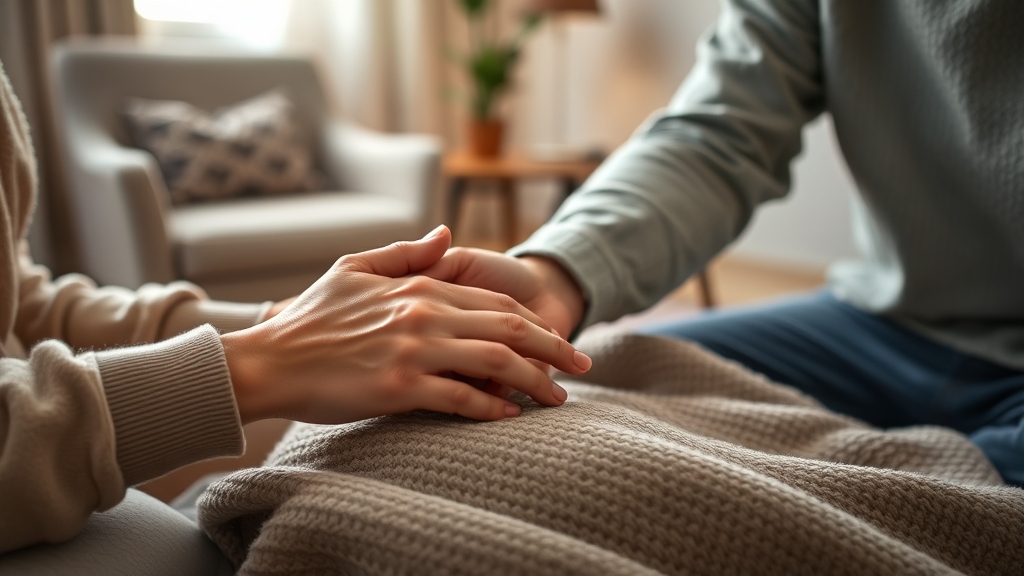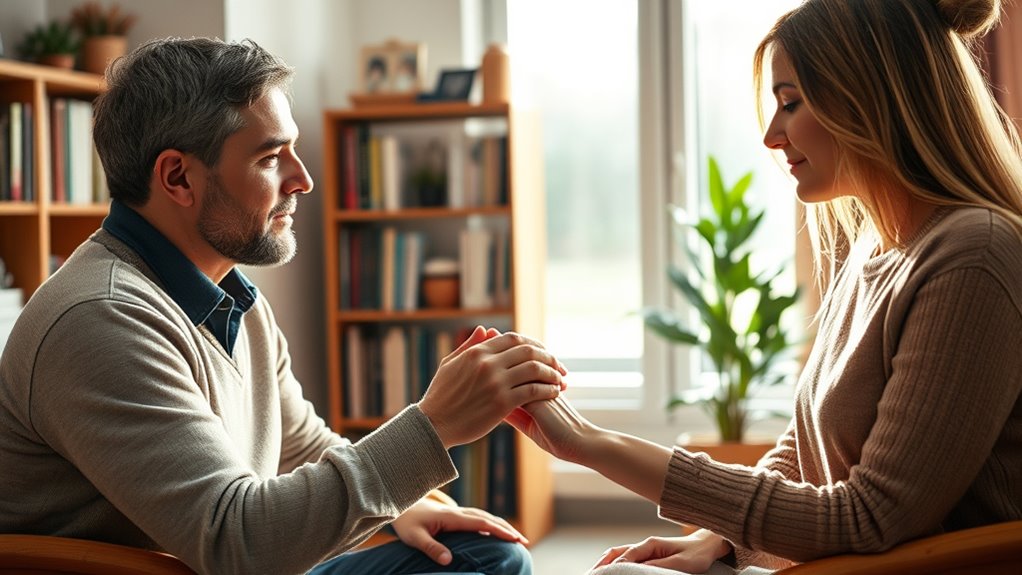Supporting a partner with love addiction means setting clear emotional boundaries, practicing patience during setbacks, and using healthy coping strategies to promote stability. Prioritize your own well-being, stay vigilant for external vulnerabilities, and offer consistent support and encouragement. Remember, recovery is a gradual process requiring compassion and unwavering commitment. As you implement these strategies, you’ll discover effective ways to nurture healing and build healthier relationship dynamics—more practical guidance awaits to assist you further.
Key Takeaways
- Establish and maintain clear emotional boundaries to protect your well-being and model healthy relationship dynamics.
- Practice patience and understanding during setbacks, viewing relapses as opportunities for reinforcement and growth.
- Support your partner’s emotional health by encouraging healthy coping strategies and emotional regulation techniques.
- Prioritize your own self-care and seek support through therapy or groups to sustain resilience and effectiveness.
- Foster long-term recovery by being consistent, compassionate, and focusing on building trust and self-awareness.

Loving someone with love addiction can be challenging, but your support can make a significant difference. When you’re committed to helping your partner through their struggles, it’s essential to understand that establishing and maintaining emotional boundaries is crucial. Love addiction often blurs the lines between healthy affection and codependency, making it easy for both of you to become entangled in patterns that reinforce unhealthy attachment. By setting clear emotional boundaries, you protect your own well-being while providing a stable foundation for your partner’s growth. Boundaries might include limiting the amount of time spent discussing certain issues, avoiding enabling behaviors, and being honest about your own needs and limits. Doing so not only helps prevent burnout but also models healthy relationship dynamics, encouraging your partner to develop self-awareness and independence.
Relapse prevention plays a vital role in supporting someone with love addiction. It’s important to recognize that recovery isn’t linear—slips and setbacks can happen, and your patience and understanding are key during these times. When your partner experiences a relapse, avoid reacting with blame or anger; instead, approach it as an opportunity to reinforce healthy coping strategies. Encourage them to reflect on what triggered the relapse and work together to develop new plans for managing those triggers in the future. This might involve engaging in therapy, practicing mindfulness, or establishing routines that promote emotional stability. Consistent reinforcement of relapse prevention techniques helps your partner build resilience and reduces the likelihood of recurring addictive behaviors. Additionally, understanding that emotional regulation can support emotional health is essential during recovery. Incorporating healthy coping mechanisms can further strengthen their resilience and aid in recovery. Recognizing the importance of boundaries and limits can also prevent future setbacks and promote healthier interactions. Moreover, being aware of potential pitfalls in adopting new payment technologies highlights the importance of staying vigilant against external vulnerabilities that could impact their overall stability.
Supporting a loved one with love addiction also means taking care of yourself. It’s easy to become emotionally overwhelmed when you’re constantly charting the rollercoaster of their needs and insecurities. Prioritize your mental health by seeking your own support system, whether that’s therapy, support groups, or trusted friends. Remember, you can’t pour from an empty cup, and maintaining your emotional health enables you to be a more effective supporter. Celebrate small victories along the way and acknowledge the progress your partner makes, no matter how incremental. Your ongoing encouragement and understanding foster a safe space where healing can occur.
Ultimately, guiding your partner through love addiction involves patience, clear boundaries, and a focus on relapse prevention. Your steadfast support can help them develop healthier relationship patterns and regain their sense of self. While it’s not always easy, your compassion and consistent efforts can inspire hope and foster long-term recovery. Keep in mind, change takes time, and your unwavering presence is a powerful catalyst for healing.
Frequently Asked Questions
How Can I Rebuild Trust After Love Addiction Has Been Revealed?
When rebuilding trust after love addiction is revealed, focus on rebuilding emotional intimacy through honest communication and patience. You should establish clear personal boundaries to protect yourself and foster a safe space. Show consistency in your actions, listen actively, and avoid blame. Over time, these steps help restore trust, allowing both of you to feel secure and connected again. Remember, healing takes time and mutual effort.
What Are Signs My Partner’S Love Addiction Is Worsening?
Imagine your partner’s love addiction as a storm cloud growing darker. Signs it’s worsening include increased emotional withdrawal, making it harder to connect, and a surge in compulsive behaviors like chasing new partners or obsessively checking messages. You might notice them avoiding serious conversations or acting impulsively to fill an emotional void. These signs show the storm is intensifying, and it’s essential to address these patterns before they cause further damage.
How Do I Set Healthy Boundaries With a Love-Addicted Partner?
To set healthy boundaries with a love-addicted partner, start by clearly defining what you’re comfortable with, emphasizing emotional independence. Communicate your needs calmly and assertively, focusing on avoiding codependency. Make certain your boundaries protect your well-being while encouraging your partner’s growth. Remember, consistent enforcement helps your partner understand limits, fostering a healthier relationship. Prioritize self-care and stay firm, knowing that establishing these boundaries supports both your emotional health and the relationship’s future.
Can Love Addiction Be Cured Without Long-Term Therapy?
Think of love addiction as a garden overgrown with weeds—you can try to clear it on your own, but sometimes, long-term therapy acts as a skilled gardener. While some may find emotional detachment and self-care strategies helpful, complete recovery often requires ongoing support. Without professional help, it’s like trying to tend a wild garden alone—progress may be slow, and weeds can return. Therapy nurtures lasting healing.
How Do I Cope Emotionally While Supporting My Partner’S Recovery?
You’re likely feeling overwhelmed while supporting your partner’s recovery, but focusing on self-care strategies helps. Prioritize activities that boost your emotional resilience, like exercise, journaling, or talking with friends. Set boundaries to protect your well-being and remind yourself that your support is valuable but not your responsibility alone. Remember, maintaining your emotional health enables you to be patient and compassionate throughout this challenging journey.
Conclusion
Supporting your partner through love addiction is like tending a fragile garden threatened by relentless storms. With patience and understanding, you become the steady sun that nurtures growth amid chaos. Remember, your compassion can be the gentle rain that helps wounds heal and trust blossom anew. Keep guiding with empathy, knowing that even in the darkest clouds, hope can pierce through, revealing a horizon where healing and love can quietly take root and flourish.









